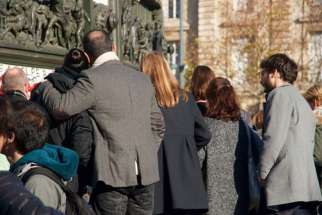Comment: CBC columnist sends message of ignorance
It would be grand to believe the CBC is for everyone. It is, after all, a national broadcaster that we all support with our tax dollars, whether we want to or not.
Comment: Rediscovering the art of dying
In the 16 months between the Supreme Court decision and the passage of federal legislation regulating medically assisted death, I was intensely involved in discussions and debates within the medical profession, among Catholic health care providers, ethicists and clergy, and with national and provincial government bodies. I was trying to mitigate the harms of the decision, particularly in the protection of the vulnerable, and in defending the right of conscientious objection for physicians and faith-based organizations.
Long shot worth taking
After years writing about euthanasia as the religion reporter for the National Post, followed by two years of public talks to convince Canadians that government-sanctioned killing would be a disaster, I think I have finally figured out what bothers me the most about what is taking place in our country: the disturbing lack of imagination that has taken over the public psyche about how to deal with people who are suffering.
Called to be different
The Christian response to terror attacks
In response to the violent acts of terrorism which have recently shaken France everyone and his conservative grandmother has an opinion on how we ought to respond.
Fear is the faith-killer
This semester, I am enrolled in a course on the History of the Reformation, the 16th-century movement led by Martin Luther which caused a break in the Catholic Church and resulted in Protestantism.
On the agenda: giving God control
TORONTO - My friends have seen my agendas, year after year, filled from the front to the back with to-do lists, various events and other little notes. With all of this organization and planning, it seems out of character for me to suddenly switch the university program I applied to for another right before the application deadline, making my future harder to visualize.
Mass entertainment
It’s 10 a.m. on a wintry Sunday and you’re sitting in a solid wood pew. The priest has stepped down from the pulpit to stand between a Nativity scene and an Advent wreath with half-melted candles counting down the weeks before Christmas. He’s speaking warmly as he delivers a heartfelt homily.
A summer to remember
When I first came to The Catholic Register in April to complete a three-week internship, I never thought I’d be staying until Labour Day — but boy, am I lucky I’ve had the opportunity to do so.
I’ve worked in a lot of places — a lot of good places, in fact. But there is something different about The Register newsroom. Here is a rare work environment, one in which people are more than just polite and conversational. Here, they care.
I graduated from my undergrad at Queen’s University in April 2011, and my experience in journalism really began in September of that year when I entered a two-year masters of journalism program at Carleton University.
I’d always been a confident person, but when it came to journalism, I wasn’t entirely sure I had what it took — and joining a class full of former editor-in-chiefs of their school papers only added to my nerves. It wasn’t until I landed myself at The Register that I really began to believe this was something I could do.
It’s rare for a summer intern to get many bylines — I know that. I see that with my classmates and friends, even the most experienced ones. But here, I’ve been fortunate enough to be given the opportunity to write full articles right from the get-go, ranging in topics from fundraising campaigns to chimney swifts, and everything in between.
In writing my stories, I’ve had the honour of interviewing so many wonderful people who make a difference in the Catholic community, people who have been kind and open and candid in a way that has allowed for my words to flow easily and for their stories to resonate with me.
But what has truly made the difference in my confidence as a journalist is not the length, type or number of stories I’ve written. Rather, it’s the unconditional support and encouragement I’ve received from my colleagues at The Register, people who have not only allowed me to realize I can be a journalist, but who have also taught me the true value of good, real relationships within a place of work.
This became especially clear to me one day about a month ago, when two faithful employees, Vanessa Santilli, the former youth editor, and Nigel Wheatley, the former web editor, both happened to be leaving at the same time.
Publisher and editor Jim O’Leary and the rest of The Register staff threw a goodbye luncheon for them, complete with gifts, cake and many words of thanks and well wishes for the future. The luncheon — which lasted far longer than a typical lunch hour — was full of hearty laughter and lively conversation.
As I looked around, I realized this is more than just a staff. It’s a family, a family of which I am so grateful to have been a part.
And so, as I head back into the world of coffee-fueled all-nighters and early-morning classes, I want to extend the greatest of thank yous to each and every person I have worked with this summer. You have each made my days here so enjoyable, and given me that extra dose of confidence I need to finish off my degree and kick-start my career.
I only wish every workplace could be like The Register.
Rebel with a cause
Blessed Pope John Paul II said that youth “must not miss out on the great opportunity to live the Gospel radically.” But why would the head of the Church call youth to live in a way that is radical?
Often in modern society, I believe there is a tendency to domesticate God. In other words, we tend to adapt God to fit our own needs and desires. We can also adapt Christ to the point that we believe He approves or permits negative actions and lifestyles. I have often met people who believed firmly that it was perfectly fine to lie or cheat if they are just white lies. Sometimes, I find it comforting to be on the receiving end of a white lie. But these actions conform to society, which marks the turning point away from God. In a society where God has no place, we, by adapting to it, leave no place for God.
As a young person, it is difficult to fight against an entire society. But Christ was called a rebel in His day and He calls us to be the same. He spoke against the evils of His time and protested against any authority that contradicted the law of God and oppressed the freedom of the children of God. He didn’t shave His head or start a secret society. But He was a radical with a capital R.
I felt confused when I heard my parish priest speaking about Christ in this way. I always thought about Jesus as being meek and gentle and never pictured Him as radical. Had I not understood the message of Christ? My then-spiritual director led me to a Gospel passage: “I have come to set the world on fire, and I wish it were already burning” (Luke 12:49). Wow, I thought, is this the same Christ that instructs us to turn the other cheek? As I read the Gospel of Matthew, I continued to be in awe: “Don’t imagine that I came to bring peace to the Earth. I came not to bring peace, but a sword” (Mt 10:34).
I began to study the Gospel and my parish priest directed me to the lives of the saints, on which I found, surprisingly, well-made full-length movies, which aside from their personal text were perhaps some of the greatest resources to see and experience this double message of Christ: to be meek and a warrior at the same time; to be obedient and humble, yet a radical and a rebel.
As the the messiah and the son of God, anyone who follows Christ belongs to His kingdom and must be ready to defend it and live His message.
A holy priest who had the privilege to celebrate Mass with Pope John Paul II once told me that giving ourselves entirely to Christ meant denying the world entirely, for the enemy of our faith is the king of the world, and with our valour and youth we can rebel against the evil of this world and fight with the weapons that Christ fought with — His love, sacrifice, prayer and example of life. So our war must not be through violence or hatred, for that would be conforming ourselves yet again to the world. Rather, through those things which the world mocks — peace, meekness, love and truth — we will succeed. This is why youth are called to live the Gospel radically and this is why Christ says, “In this world you will have trouble. But take heart! I have overcome the world” (John 16:33).
(Guzman, 20, is a third order member of the Institute of the Incarnate Word.)
Dull roar of toothless lions
With the 50th anniversary of the opening of the Second Vatican Council less than two weeks away (Oct. 11), the old lions of the council are getting ready to roar once again.
As a young priest, Pope Benedict XVI was at the council as a theological advisor, or peritus. As Pope he has made the proper interpretation of the council a key part of his teaching, and declared a Year of Faith to begin on Oct. 11, asking the Church to rediscover the riches of the council in light of the demands of the new evangelization.
There are other lions too. Some of them will be highlighted at a Vatican II conference this weekend at Saint Paul’s University in Ottawa. The conference has been criticized as being something of an oldtimers’ game for theological dissenters. The presence of Gregory Baum, the former priest who at one time had a rewarding career proposing that the Church was wrong on just about every issue in which her teaching clashed with secular culture, set off alarm bells for those easily alarmed. He too was a peritus at the council. But at nearly 90 years old, Baum is a lion no longer. More than a theological force, he is now of principal interest as a relic of a time when the future of the Church was going to be an abrupt break with her past. Baum and his companions thought that Vatican II meant a new Church, adapted to the times and taking its lead from the ambient culture. The idea that the ambient culture of the late 1960s and 1970s was a special repository of wisdom was just one fatal flaw in that scheme.
The Catholic journalist Robert Blair Kaiser is another of the old lions, rather grumpy now that the new Church never quite took hold in the Catholic world as it did in the world of mainline Protestantism. He wrote recently about the council, quoting the Jesuit historian John O’Malley, about how exciting it all was back when he was a young journalist covering the new Church about to be born. Vatican II, he wrote, took the Church “from commands to invitations, from laws to ideals, from definition to mystery, from threats to persuasion, from coercion to conscience, from monologue to dialogue, from ruling to service, from withdrawn to integrated, from vertical to horizontal, from exclusion to inclusion, from hostility to friendship, from rivalry to partnership, from suspicion to trust, from static to ongoing, from passive acceptance to active engagement, from fault finding to appreciation, from prescriptive to principled, from behaviour modification to inner appropriation.”
It’s amazing the Church staggered through nineteen-and-a-half centuries in such sorry shape, until everything was made new in the 1960s, from tradition to buzzwords all around. Going from “behaviour modification” to “inner appropriation” likely means little, but the general direction is clear. One does not change one’s behaviour in response to the Gospel standard, but rather appropriates what one already is and how one already lives.
Blessed John Paul II had a rather different idea of the council’s task, as he wrote in preparation for the Great Jubilee:
“The Second Vatican Council was a providential event, whereby the Church began the more immediate preparation for the Jubilee of the Second Millennium. It was a Council similar to the earlier ones, yet very different; it was a Council focused on the mystery of Christ and His Church and at the same time open to the world. This openness was an evangelical response to recent changes in the world, including the profoundly disturbing experiences of the 20th century, a century scarred by the First and Second World Wars, by the experience of the concentration camps and by horrendous massacres. All these events demonstrate most vividly that the world needs purification; it needs to be converted” (Tertio Millennio Adveniente, # 18).
The conference at Saint Paul’s may be rather light on the need of the Church to purify and convert the world. That will be the rather intense focus of the synod on the new evangelization to be held in Rome next month. The more relevant speakers this weekend in Ottawa will have the same focus, led by Cardinal Peter Turkson, the Ghanaian prelate now heading up the Holy See’s office for justice and peace. But the retired lions will also have their say, like old men gathering to tell the stories about how wise they were once, and how their wisdom lives on still. It’s polite to listen, as one throws a toothless lion a bone.
Co-operatives could be the basis for a new economic model
In designating 2012 as The Year of Co-operatives, the United Nations has recognized that co-operatives are a powerful force for positive social and environmental change and thus instruments for building a better world.
Canadian experience gives clear witness to this truth. The pioneer Alphonse Desjardins established the first caisse or credit union in Levi, Que., in 1901, following the innovative European financial model of savings and credit owned and governed by its members.
Recognizing that French Canadians had no tradition of saving and that many were forced to leave Quebec in times of economic crisis, the Catholic clergy endorsed the new caisses and received Pope Pius X’s approval for priests to manage local branches. By 1963, Quebec had 1,248 caisses with assets of over $1 billion and 1.5 million members. Co-operatives soon spread across Canada.
Despite many trials, the movement prospered and today Canada has 9,000 co-operatives with a combined membership of 18 million and annual revenue of $50 billion. And so the Canadian Association has good reason to celebrate The Year of Co-operatives with an international summit Oct. 6-11 in Quebec City. The theme is “The Amazing Power of Co-operatives.”
In reading the promotion literature for this event, one discovers a remarkable resonance between it and recent teaching by Pope Benedict in his social encyclical Caritas in Veritate. He sees the promotion of social or civic economy as a way to modify, indeed civilize, our present economy. For him, business may or may not aim at profit, but it should have the primary goals of social and human welfare.
In co-operatives and credit unions, where members are owners, there is a more communal appeal to taking initiatives, making decisions and sharing earnings. Co-operative leaders and Benedict both foresee a real possibility for the co-operative approach to grow and become powerful enough to influence mainstream business into becoming more civilized and less focused on monopolistic markets.
The Pope writes in Caritas in Veritate: “Without prejudice to the importance and the economic and social benefits of the more traditional forms of business, they (social or civic business) steer the system towards a clearer and more complete assumption of duties on the part of the economic subjects. And not only that. The very plurality of institutional forms of business gives rise to a market which is not only more civilized but also more competitive.”
The co-operative movement can take many forms, including mutual insurance, agriculture, housing, many kinds of consumer and production goods, including housing and hotels, and financial institutions. In 600 municipalities in Quebec and 380 in the rest of Canada, credit unions are the only financial institution. And credit unions are ranked 18th among the 50 safest banks in the world.
Co-operatives are guided by seven principles: voluntary and open membership; democratic member control; autonomy and independence; education training; information; co-operation among co-operatives; and concern for the community. Thus they promote democracy, self-help, equality and solidarity, all of which reflect Pope Benedict’s own expectation for social economy.
In recent years, co-operatives, especially credit unions, have developed rapidly in poor countries. Nelson Kuria, CEO of the co-operative group in Kenya, who will be coming to the Quebec Summit, states: “I have no doubt that the co-operative model provides a most effective institutional mechanism for responding to the development challenges of the African continent on a sustainable basis. Co-operatives can simultaneously promote wealth creation, poverty alleviation and more equitable distribution of resources.”
Tom Webb, who helped create the international Master of Management, Co-operatives and Credit Unions program at Saint Mary’s University, Halifax, says: “It’s time to unplug ourselves from the old global economics and plug into the enormous potential of cooperative economics to truly build a better world.”
Is Tom dreaming? Probably not. If the co-operative movement were able to collaborate effectively on the international level — with one-billion members and $1.6 trillion annual income (counting only the largest 300 co-operatives) — it could significantly influence the future global economy.
And so the Quebec summit will be emphasizing how co-operatives weathered the economic crisis better than ordinary business and banks, and planning how co-operatives can have a much greater impact on economic thinking, planning, policy and action taken by business, government and international agencies in Canada and around the world.










